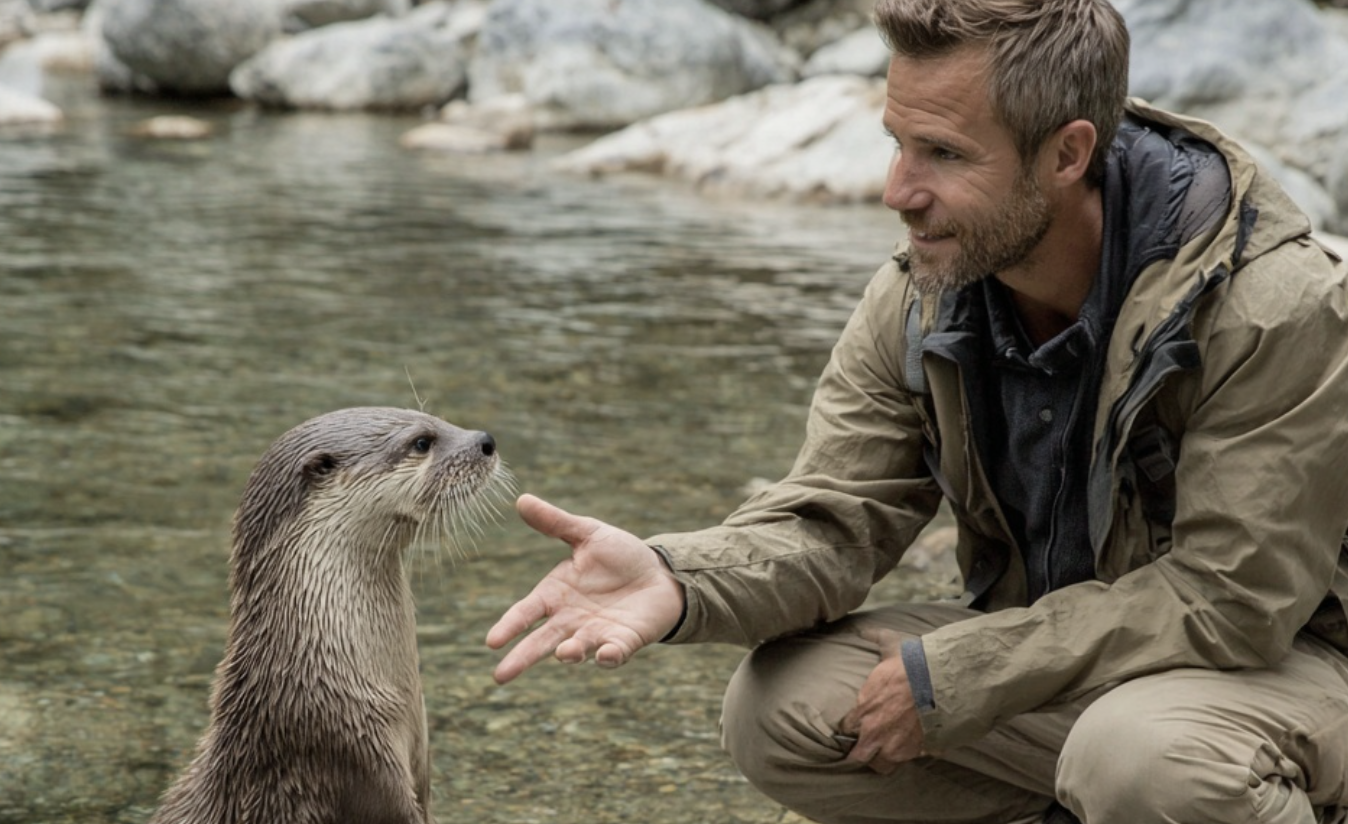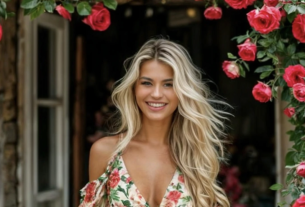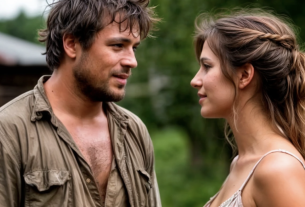It happened in August of last year. A warm, salty breeze from the sea caressed the fishermen’s faces, and the sun, still unwearied by summer, played with shimmering reflections on the water. The pier in the bay was ordinary—old planks, the creak of ropes, the smell of seaweed and brine. Every day began and ended here with the same laborious routine: cleaning nets, loading the catch, talking about the weather and about luck. Nothing foretold a miracle.
But the miracle came… from the depths.
First, they heard a slap—a wet, swift sound of something slipping out of the water and hopping across the planks. Everyone turned. On the pier stood an otter. A male. Wet, trembling, with eyes full of panic and pleading. He didn’t run away, didn’t hide as wild animals usually do. No. He darted between people, touched someone’s leg with his paw, whimpered thinly, almost like a child, and then rushed again to the edge of the pier.
“What the hell?” muttered one of the sailors, putting aside a coil of rope.
“Forget it, it’ll leave on its own.”
But it didn’t leave. It was begging.
One of the older men, his face etched with wrinkles from sun and wind, named Igor, suddenly understood. He wasn’t a biologist, hadn’t read scientific articles. Something ancient just flickered in his eyes—an instinct that remembered the times when humans and nature still spoke the same language.
“Wait…” he said quietly. “She wants us to follow her.”
He stepped toward the edge. The otter immediately scurried forward, glancing back as if to make sure he was coming.
And then Igor saw.
There, below, tangled in a web of old nets, among scraps of seaweed and torn ropes, an otter was thrashing. A female. Her paws were trapped tight, her tail slapped helplessly at the water. Every movement only pulled her deeper into the snare. She was suffocating. Her eyes were full of terror. And nearby, floating on the surface, was a tiny baby—a little ball of fur pressed against its mother, not understanding what was happening, but sensing death.
The male otter, the one who had come for help, sat on the edge of the planks and watched. He didn’t whimper. He didn’t run anymore. He just watched. And in that gaze there was more humanity than in many humans.
“Quick!” shouted Igor. “Here! She’s down there! Tangled!”
The fishermen rushed to the edge. Someone jumped into a boat, someone started cutting the nets. Everything unfolded in a wild, tense silence, broken only by the animal’s ragged breathing and the splash of waves.
Minutes stretched like hours.
When they finally freed the female, she was on the brink. Her body trembled, her paws barely moved. But the baby pressed against her, and she weakly licked it in response.
“Release them!” someone yelled. “Into the sea! Hurry!”
They gently lowered them into the water. And in the same instant—the mother and baby—disappeared into the depths. The male, who had stood motionless all this time, dove in after them.
Everyone froze. No one spoke. They just breathed, as if they had just come back from battle.
And then, a few minutes later, the water rippled again.
He returned.
Alone.
He surfaced right at the pier, looked at the people. Then, slowly, with effort, he pulled out a stone from under his front paw. Gray, smooth, slightly elongated—clearly worn by years, cherished. He placed it on the wooden plank. The very one where he had just been running, begging for help.
And disappeared.
Silence.
No one stirred. Even the wind seemed to stop blowing.
“He… he left us… his stone?” whispered a young guy, almost a boy.
Igor sank to his knees. Picked up the stone. Cold. Heavy. But not heavy in weight—heavy in meaning.
“Yes…” he said, his voice trembling. “He gave us the most precious thing he had. Because for an otter this stone is like a heart. It’s their tool, their weapon, their toy, their memory. They carry it all their lives. Every otter finds its own—and never parts with it. It doesn’t just use it to crack shells… it loves it. It sleeps with it, plays with it, passes it on to its young. It’s family. It’s life.
“And he… he gave it to us.”
Tears rolled down Igor’s cheeks. He wasn’t ashamed of them. No one was.
Because at that moment everyone understood: he was saying thank you. Not with barking, not with a wag of the tail. Not with a gesture, not with a sound. He gave the most precious thing he had. Like a man giving his last shirt to save another.
Someone filmed it on their phone. The video was 20 seconds long. But those 20 seconds were enough to break millions of hearts.
It spread around the world. People wrote:
“I cried like a child.”
“After this I stopped thinking animals are just machines.”
“I was angry at my neighbor today because of the noise… And the otter gave everything for love.”
Scientists later said that otters are among the most emotional animals. That they cry when they lose their babies. That they sleep holding paws so they don’t drift apart. That they play not for food, but for joy. That they have a soul.
But in that act—in that stone lying on the old planks—there was more than just a soul.
There was gratitude. Pure. Selfless. Immaterial. The kind that’s rare even among people.
Igor still keeps that stone. On a shelf, next to a photo of his wife, who passed away five years ago. He says that sometimes, in the silence, he looks at it and thinks:
“Maybe we can learn something from animals too?”
Because in a world where everyone only thinks of themselves, where kind deeds hide like in a cave—one little otter showed that love and gratitude are stronger than instinct.
That the heart—it’s not in the chest. It’s in the act.
And the stone?
The stone is memory.
A reminder that even in the wild, in the depths of the sea, something greater than survival lives.
A heart lives.
If you have a minute—leave a like. Share this story. Maybe someone, after reading it, will pause, look at the world differently. See not a nuisance in a running dog, but a friend. Not noise in a bird on a branch, but a song. Not a creature in a beast, but a brother.
And maybe one day, we too can leave on the shore not trash… but something truly precious.
Like a stone.
Like a heart.
Like love.



